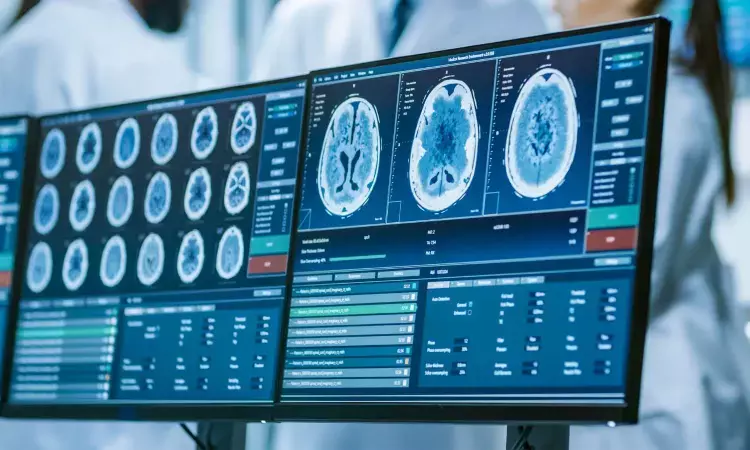- Home
- Medical news & Guidelines
- Anesthesiology
- Cardiology and CTVS
- Critical Care
- Dentistry
- Dermatology
- Diabetes and Endocrinology
- ENT
- Gastroenterology
- Medicine
- Nephrology
- Neurology
- Obstretics-Gynaecology
- Oncology
- Ophthalmology
- Orthopaedics
- Pediatrics-Neonatology
- Psychiatry
- Pulmonology
- Radiology
- Surgery
- Urology
- Laboratory Medicine
- Diet
- Nursing
- Paramedical
- Physiotherapy
- Health news
- Fact Check
- Bone Health Fact Check
- Brain Health Fact Check
- Cancer Related Fact Check
- Child Care Fact Check
- Dental and oral health fact check
- Diabetes and metabolic health fact check
- Diet and Nutrition Fact Check
- Eye and ENT Care Fact Check
- Fitness fact check
- Gut health fact check
- Heart health fact check
- Kidney health fact check
- Medical education fact check
- Men's health fact check
- Respiratory fact check
- Skin and hair care fact check
- Vaccine and Immunization fact check
- Women's health fact check
- AYUSH
- State News
- Andaman and Nicobar Islands
- Andhra Pradesh
- Arunachal Pradesh
- Assam
- Bihar
- Chandigarh
- Chattisgarh
- Dadra and Nagar Haveli
- Daman and Diu
- Delhi
- Goa
- Gujarat
- Haryana
- Himachal Pradesh
- Jammu & Kashmir
- Jharkhand
- Karnataka
- Kerala
- Ladakh
- Lakshadweep
- Madhya Pradesh
- Maharashtra
- Manipur
- Meghalaya
- Mizoram
- Nagaland
- Odisha
- Puducherry
- Punjab
- Rajasthan
- Sikkim
- Tamil Nadu
- Telangana
- Tripura
- Uttar Pradesh
- Uttrakhand
- West Bengal
- Medical Education
- Industry
Amino acid PET is accurate in differential diagnosis of recurrent brain metastases: Study

Germany: Amino acid PET has good accuracy in the differential diagnosis of recurrent brain metastases, a recently published meta-analysis in The Journal of Nuclear Medicine has shown.
A specificity of 84% indicates that amino acid PET may reduce the number of invasive procedures and overtreatment in patients with treatment-related changes. This study provides class IIa evidence on using amino acid PET in the differential diagnosis of recurrent brain metastases.
Brain metastases occur in 20 to 40 percent of all cancer patients. They are most likely to occur in those with lung, breast and renal cancer, melanoma, and gastrointestinal tract cancers. Management of patients with brain metastases usually includes surgery, radiation and chemotherapy. Some patients develop treatment-related changes such as radiation necrosis or pseudoprogression.
“A differentiation between recurrent or progressive brain metastases and treatment-related changes is challenging,” said Igor Yakushev, senior physician in the nuclear medicine department at the Technical University of Munich in Germany. “As the management of patients with recurrent or progressive brain metastases and treatment-related changes is fairly different, accurate and early differential diagnosis is essential.”
The meta-analysis included 12 studies with amino acid PET radiotracers. The studies included a total of 397 patients with 547 lesions. 269 lesions (49 percent) were recurrent or progressive brain metastases. Using a histologic examination and radiological and clinical follow-up as reference, the pooled sensitivity and specificity of amino acid PET were 82 and 84 percent, respectively.
“This study provides IIa class evidence on the diagnostic utility of amino acid PET in the differential diagnosis of recurrent or progressive brain metastases,” stated Yakushev. “These findings align with an increasing role of molecular imaging in the management of patients with brain tumors, yet the results also point to the potential for further improvement of diagnostic accuracy.”
Reference:
Timo Schlürmann, Birgit Waschulzik, Stephanie Combs, Jens Gempt, Benedikt Wiestler, Wolfgang Weber and Igor Yakushev, Journal of Nuclear Medicine May 2023, 64 (5) 816-821; DOI: https://doi.org/10.2967/jnumed.122.264803.
Dr Kamal Kant Kohli-MBBS, DTCD- a chest specialist with more than 30 years of practice and a flair for writing clinical articles, Dr Kamal Kant Kohli joined Medical Dialogues as a Chief Editor of Medical News. Besides writing articles, as an editor, he proofreads and verifies all the medical content published on Medical Dialogues including those coming from journals, studies,medical conferences,guidelines etc. Email: drkohli@medicaldialogues.in. Contact no. 011-43720751


